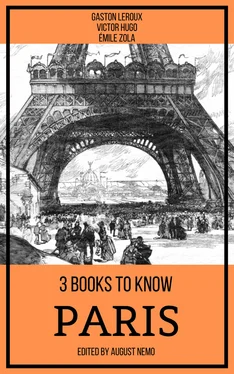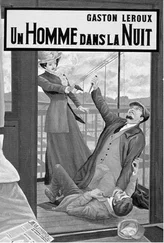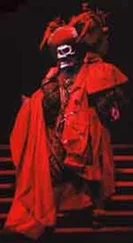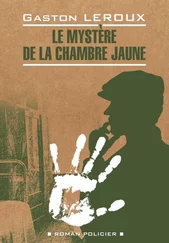“In truth,” said Gringoire to himself, “she is a salamander, she is a nymph, she is a goddess, she is a bacchante of the Menelean Mount!”
At that moment, one of the salamander’s braids of hair became unfastened, and a piece of yellow copper which was attached to it, rolled to the ground.
“Hé, no!” said he, “she is a gypsy!”
All illusions had disappeared.
She began her dance once more; she took from the ground two swords, whose points she rested against her brow, and which she made to turn in one direction, while she turned in the other; it was a purely gypsy effect. But, disenchanted though Gringoire was, the whole effect of this picture was not without its charm and its magic; the bonfire illuminated, with a red flaring light, which trembled, all alive, over the circle of faces in the crowd, on the brow of the young girl, and at the background of the Place cast a pallid reflection, on one side upon the ancient, black, and wrinkled façade of the House of Pillars, on the other, upon the old stone gibbet.
Among the thousands of visages which that light tinged with scarlet, there was one which seemed, even more than all the others, absorbed in contemplation of the dancer. It was the face of a man, austere, calm, and sombre. This man, whose costume was concealed by the crowd which surrounded him, did not appear to be more than five and thirty years of age; nevertheless, he was bald; he had merely a few tufts of thin, gray hair on his temples; his broad, high forehead had begun to be furrowed with wrinkles, but his deep-set eyes sparkled with extraordinary youthfulness, an ardent life, a profound passion. He kept them fixed incessantly on the gypsy, and, while the giddy young girl of sixteen danced and whirled, for the pleasure of all, his revery seemed to become more and more sombre. From time to time, a smile and a sigh met upon his lips, but the smile was more melancholy than the sigh.
The young girl, stopped at length, breathless, and the people applauded her lovingly.
“Djali!” said the gypsy.
Then Gringoire saw come up to her, a pretty little white goat, alert, wide-awake, glossy, with gilded horns, gilded hoofs, and gilded collar, which he had not hitherto perceived, and which had remained lying curled up on one corner of the carpet watching his mistress dance.
“Djali!” said the dancer, “it is your turn.”
And, seating herself, she gracefully presented her tambourine to the goat.
“Djali,” she continued, “what month is this?”
The goat lifted its fore foot, and struck one blow upon the tambourine. It was the first month in the year, in fact.
“Djali,” pursued the young girl, turning her tambourine round, “what day of the month is this?”
Djali raised his little gilt hoof, and struck six blows on the tambourine.
“Djali,” pursued the Egyptian, with still another movement of the tambourine, “what hour of the day is it?”
Djali struck seven blows. At that moment, the clock of the Pillar House rang out seven.
The people were amazed.
“There’s sorcery at the bottom of it,” said a sinister voice in the crowd. It was that of the bald man, who never removed his eyes from the gypsy.
She shuddered and turned round; but applause broke forth and drowned the morose exclamation.
It even effaced it so completely from her mind, that she continued to question her goat.
“Djali, what does Master Guichard Grand-Remy, captain of the pistoliers of the town do, at the procession of Candlemas?”
Djali reared himself on his hind legs, and began to bleat, marching along with so much dainty gravity, that the entire circle of spectators burst into a laugh at this parody of the interested devoutness of the captain of pistoliers.
“Djali,” resumed the young girl, emboldened by her growing success, “how preaches Master Jacques Charmolue, procurator to the king in the ecclesiastical court?”
The goat seated himself on his hind quarters, and began to bleat, waving his fore feet in so strange a manner, that, with the exception of the bad French, and worse Latin, Jacques Charmolue was there complete,—gesture, accent, and attitude.
And the crowd applauded louder than ever.
“Sacrilege! profanation!” resumed the voice of the bald man.
The gypsy turned round once more.
“Ah!” said she, “‘tis that villanous man!” Then, thrusting her under lip out beyond the upper, she made a little pout, which appeared to be familiar to her, executed a pirouette on her heel, and set about collecting in her tambourine the gifts of the multitude.
Big blanks, little blanks, targes* and eagle liards showered into it.
* A blank: an old French coin; six blanks were worth two sous
and a half; targe, an ancient coin of Burgundy, a farthing.
All at once, she passed in front of Gringoire. Gringoire put his hand so recklessly into his pocket that she halted. “The devil!” said the poet, finding at the bottom of his pocket the reality, that is, to say, a void. In the meantime, the pretty girl stood there, gazing at him with her big eyes, and holding out her tambourine to him and waiting. Gringoire broke into a violent perspiration.
If he had all Peru in his pocket, he would certainly have given it to the dancer; but Gringoire had not Peru, and, moreover, America had not yet been discovered.
Happily, an unexpected incident came to his rescue.
“Will you take yourself off, you Egyptian grasshopper?” cried a sharp voice, which proceeded from the darkest corner of the Place.
The young girl turned round in affright. It was no longer the voice of the bald man; it was the voice of a woman, bigoted and malicious.
However, this cry, which alarmed the gypsy, delighted a troop of children who were prowling about there.
“It is the recluse of the Tour-Roland,” they exclaimed, with wild laughter, “it is the sacked nun who is scolding! Hasn’t she supped? Let’s carry her the remains of the city refreshments!”
All rushed towards the Pillar House.
In the meanwhile, Gringoire had taken advantage of the dancer’s embarrassment, to disappear. The children’s shouts had reminded him that he, also, had not supped, so he ran to the public buffet. But the little rascals had better legs than he; when he arrived, they had stripped the table. There remained not so much as a miserable camichon at five sous the pound. Nothing remained upon the wall but slender fleurs-de-lis, mingled with rose bushes, painted in 1434 by Mathieu Biterne. It was a meagre supper.
It is an unpleasant thing to go to bed without supper, it is a still less pleasant thing not to sup and not to know where one is to sleep. That was Gringoire’s condition. No supper, no shelter; he saw himself pressed on all sides by necessity, and he found necessity very crabbed. He had long ago discovered the truth, that Jupiter created men during a fit of misanthropy, and that during a wise man’s whole life, his destiny holds his philosophy in a state of siege. As for himself, he had never seen the blockade so complete; he heard his stomach sounding a parley, and he considered it very much out of place that evil destiny should capture his philosophy by famine.
This melancholy revery was absorbing him more and more, when a song, quaint but full of sweetness, suddenly tore him from it. It was the young gypsy who was singing.
Her voice was like her dancing, like her beauty. It was indefinable and charming; something pure and sonorous, aerial, winged, so to speak. There were continual outbursts, melodies, unexpected cadences, then simple phrases strewn with aerial and hissing notes; then floods of scales which would have put a nightingale to rout, but in which harmony was always present; then soft modulations of octaves which rose and fell, like the bosom of the young singer. Her beautiful face followed, with singular mobility, all the caprices of her song, from the wildest inspiration to the chastest dignity. One would have pronounced her now a mad creature, now a queen.
Читать дальше









